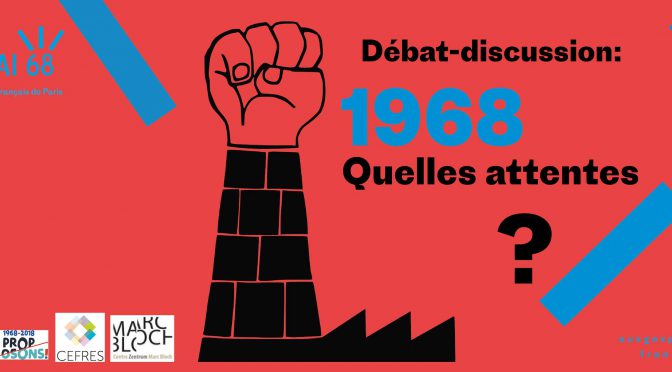
Debata-diskuze
Čas a místo: Francouzský institut v Berlíně, sál Boris Vian (Kurfürstendamm 211, Berlin), v 19h
Organizátoři: Centre Marc Bloch, Francouzský institut v Berlíně, CEFRES a Univerzita Nanterre, za podpory Francouzského institutu v Praze
Organizátorky: Catherine Gousseff (Centre Marc Bloch), Sylvie Robic (Univerzita Nanterre), Clara Royer (CEFRES), Dominique Treilhou (Francouzský institut v Berlíně)
Jazyky: francouzština, němčina (simultánně tlumočeno)
Tato debata u kulatého stolu se uskuteční v rámci cyklu projekcí, přednášek, workshopů a výstav s názvem Cyklus Květen 68 při příležitosti uplynutí padesáti let od květnových událostí roku 1968.
Za účasti významných svědků evropských událostí roku 1968:
- Libuše Černá (Česká republika)
- Jan Gross (Polsko)
- Jean-Yves Potel (Francie)
- Peter Schneider (Německo)
Moderátor: Thomas Wieder (Le Monde)
Více informací ve francouzštině na: Cyklus Květen 1968.
Podívejte se také na další události Cyklu Květen 68: mezinárodní konference Východní vítr, západní vítr a závěrečná přednáška Den 68 v Praze.
Program Cyklu Květen 68 ve francouzštině zde
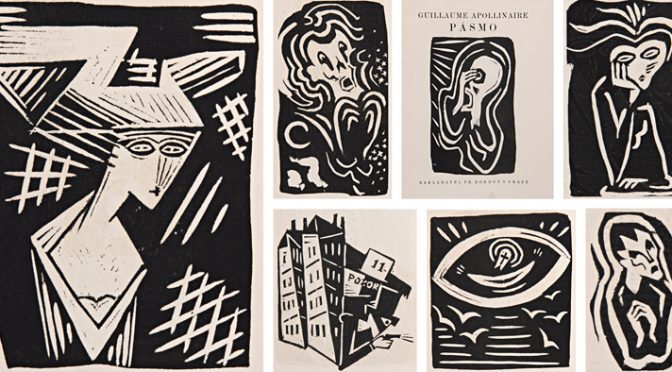
V rámci programu Evropský rok kulturního dědictví 2018 a projektu Naše století připravil Památník národního písemnictví výstavu s názvem NAŠE FRANCIE. Francouzská poezie v českých překladech a ilustracích 20. století., která bude k vidění od 11. května do 31. října 2018 v letohrádku Hvězda. Při té příležitosti pořádá CEFRES 3. května seminář zaměřený na překlad poezie.
Kde: Francouzský institut v Praze, 5. patro (Štěpánská 35, 110 00 Praha 1)
Kdy: 18:00-19:30
Jazyk: francouzština
Přednášející:
- Robert Kolár (ÚČL AV ČR)
- Guillaume Métayer (CELLF-CNRS)
- Jiří Pelán (FF UK)
- Jovanka Šotolová (FF UK)
Moderátoři: Antoine Marès (Université Paris 1 Panthéon-Sorbonne) a Clara Royer (CEFRES)
Ilustrace: Linořezy Josefa Čapka in Apollinaire, G., Pásmo, 1919, přeloženo Karlem Čapkem.
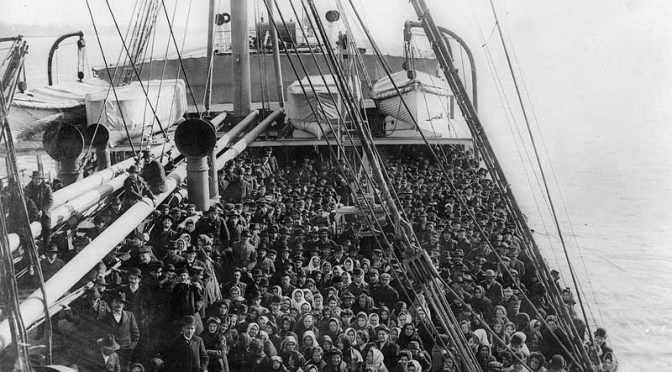
Šesté setkání epistemologického semináře v roce 2018 pořádaného CEFRESem a IMS FSV UK.
Florence Vychytil-Baudoux (CEFRES – EHESS)
Transborder Societies : Diaspora and its Limits as an Analytical Concept
Kde: knihovna CEFRESu – Na Florenci 3, 110 00 Praha 1
Kdy: čtvrtek 3. května 2018 od 15:30 do 17:00
Jazyk: angličtina
Texty :
- Rogers Brubaker, “The ‘Diaspora’ Diaspora”, Ethnic and Racial Studies, vol. 28, n° 1, leden 2005, str. 1-19.
Více o semináři zde!

Páté setkání epistemologického semináře v roce 2018 pořádaného CEFRESem a Institutem mezinárodních studií FSV UK bude vedeno dvěma doktorandy:
Jan Koutník (FSV UK): Competitive Authoritarianism
Jamal Yazliyeva (FSV UK): Media Censorship
Místo: CEFRES (3. patro, budova C), Na Florenci 3, 110 00 Prague 1
Datum: čtvrtek 19. dubna 2018, od 15h30
Jazyk: angličtina
Texty:
- Levitsky and Way, Competitive Authoritarianism: Hybrid Regimes after the Cold War, Cambridge University Press, 2010, p. 1-36.
- Irum Saeed Abbasi and Laila Al-Sharqi, “Media censorship: Freedom versus responsibility. Review”, Journal of Law and Conflict 7(4), August 2015, p. 21-25.
Ilustrace: Ivan Kafka: Koberec pro nahodilého houbáře VI [Tapis pour ramasseur de champignon occasionnel] (1998)
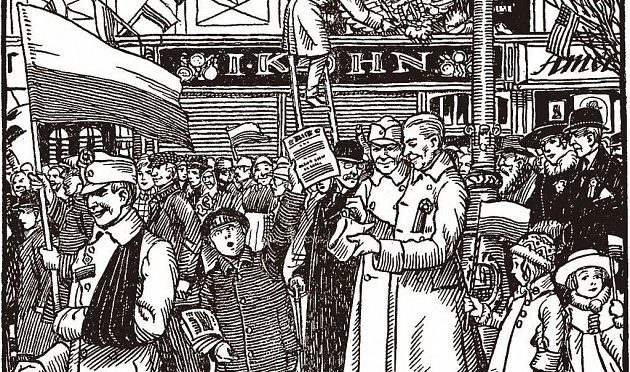
Přednáška Ségolène PLYER (Univerzita ve Štrasburku)
Místo: CEFRES, Na Florenci 3, Praha 1 (zasedací místnost, budova C, 3. patro)
Čas: 17h00-18h30
Organizátor: CEFRES
Jazyk: angličtina
Změna politického režimu v Čechách na konci roku 1918 byla poměrně klidná. Avšak nyní archivy odhalují, kolik současníků se obávalo pádu Habsburské monarchie i přesto, že měli od nové Republiky velká očekávání. Prostřednictvím požadavků, váhání a konfliktů, které se na sebe vršily až do roku 1919, nám případ oblasti podhůří na slezské hranici (kde bylo jak české, tak německé obyvatelstvo) ukáže, jak se nový společenský pakt sjednával také na lokální úrovni.
Ilustrace: Litografie z: https://nachodsky.denik.cz/kultura_region/pamatne-rijnove-dny-roku–v-hradci-kralove20081028.html
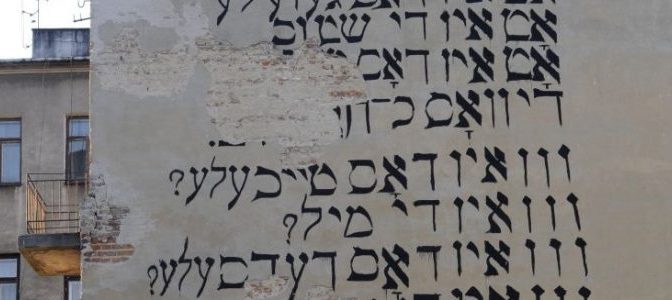
Přednášku v rámci semináře o soudobých dějinách Židů organizovaného Ústavem pro soudobé dějiny AV ČR ve spolupráci s Masarykovým ústavem přednese Karolina Szymaniak (Univerzita ve Vratislavi).
Místo: knihovna CEFRESu, Na Florenci 3, 110 00 Praha 1
Čas: od 17h do 18h30
Jazyk: angličtina
Abstrakt
Když v roce 1988 básník Marcin Świetlicki formuloval ve své dnes slavné básni ostrou kritiku rétoriky kulturní opozice, napsal: “Místo toho, aby řekli: Bolí mě zuby, jsem hladový, jsem osamělý (…) / říkají tiše: Wanda / Wasilewska, Cyprián Kamil Norwid, / Józef Piłsudski, Ukrajina, Litva / Thomas Mann, Bible a nakonec cosi nepatrného v jidiš“. Jak ukázala Eugenie Prokop-Janiec, v 80. letech se jidiš stalo součástí nezávislé kultury a jeho používání se stalo formou odporu. Ale co bylo toto nedefinované “nepatrné cosi” a jaká tradice podporovala jeho přítomnost v polském diskurzu? Jaký význam a jaký obsah mu byl svěřen? Jak se tato tradice podepisuje na současných představách o polské židovské minulosti a na způsobu, jakým píšeme o kulturní historii v Polsku?
Přednáška bude probíhat formou diskuse o stávajících a dalších možných přístupech ke studiu polsko-jidišských kulturních výměn ve 20. století, dále o jejich mezích a důsledcích. Jedná se o pracovní prezentaci na probíhajícím projektu. Nahlédnutím do historie polsko-jidišských kulturních vztahů, jejich diskurzu a jejich interpretování skrze různé pohledy na kulturní studie, se výzkum snaží navrhnout další způsoby konceptualizace dějin kultury v Polsku. Tento přístup zohledňuje aspekty menšin, respektuje jejich nezávislost a vytváří prostor, ve kterém se toto “nepatrné cosi” stává komplexním polyfonním jevem, který má svá vlastní pravidla.






